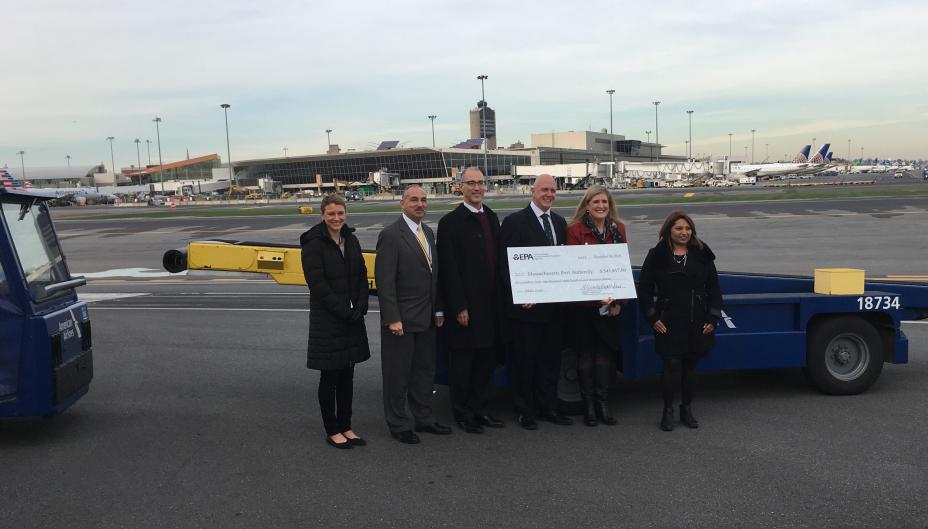News Releases from Region 01
EPA Awards $541,000 to Massport to Replace Diesel Equipment at Boston Logan Airport
Using electric equipment will reduce diesel emissions; New funding opportunities now available
BOSTON – The U.S. Environmental Protection Agency (EPA) has awarded a $541,817 grant to the Massachusetts Port Authority (Massport) to replace diesel powered ground equipment working at Boston Logan Airport. The grant is made available under a competitive national grant program administered by EPA with funding authorized by Congress under the Diesel Emissions Reduction Act (DERA).
EPA has today also announced the availability of grant funding to implement projects aimed at reducing emissions from the nation’s existing fleet of older diesel engines.
EPA New England Regional Administrator Alexandra Dunn said, “EPA is very pleased that this funding will help our partner Massport to reduce diesel emissions at the region’s largest airport, providing cleaner air for both travelers and workers. Reducing diesel emissions helps to improve air quality and protects people's health. This project will significantly reduce diesel emissions, meaning cleaner air for everyone. Reducing diesel emissions is especially important for children, and for people who suffer from asthma and other respiratory problems.”
City of Boston Mayor Martin J. Walsh said, “The health and safety of Boston residents is my number one priority, and this funding will allow for important work to happen that will make our city a greener, healthier Boston for all. I applaud the EPA and Massport for taking this step to reduce air pollution in the City of Boston and our surrounding communities.”
The Massachusetts Port Authority was awarded the EPA grant to replace 25 pieces of diesel powered ground support equipment with all-electric versions operating at Boston Logan International Airport. The equipment includes baggage tractors, belt loaders and push back tugs. Once fully implemented, this project will result in annual emissions reductions of 0.5 tons of PM2.5 and 4.5 tons of NOx. Since 2011, EPA has awarded a total of $2,175,000 to Massport for projects to reduce diesel emissions at Logan Airport and within greater Boston. The EPA grant will be matched by a Massport contribution of $622,221.
Commonwealth of Massachusetts Transportation Secretary and CEO Stephanie Pollack said, “With the transportation sector accounting for 44 percent of all greenhouse gas emissions in Massachusetts, we welcome EPA’s support for effective actions to reduce them, such as Massport’s efforts to replace diesel-powered equipment with electric at Logan Airport.”
Massport Acting CEO John Pranckevicius said, “We thank the EPA for this grant as it complements our overall efforts to reduce harmful emissions at Logan Airport. We have worked in coordination with elected officials and Congressional delegation in making environmental initiatives a top priority. Along with our airline tenant partners, Massport’s goal is to replace all ground service equipment with available electric alternatives by 2027, reducing non-aircraft emissions at Logan by nearly 40 percent.”
According to Massport, this grant will be utilized in conjunction with an FAA VALE grant Massport received this fall to install eGSE (electric ground service equipment) charging stations as part of the Terminal B consolidation project. American Airlines has pledged to replace 115 pieces of existing GSE with eGSE over the next few years. Currently American Airlines has 32 pieces of eGSE at Logan, or 1% of their overall fleet. Logan wide, approximately 9.5% of the existing GSE fleet is electric.
Bradley Campbell, President of Conservation Law Foundation said, “This EPA grant is a perfect match with MassPort’s nation-leading efforts, and its agreement with CLF, to reduce and ultimately eliminate soot, smog and greenhouse gas emissions from its ground service equipment. The health of the communities surrounding the airport will continue to benefit from a greener Logan.”
Older diesel engines emit large amounts of pollutants such as nitrogen oxides and particulate matter. These pollutants aggravate asthma, damage lung tissue, and cause other serious health problems; children are especially vulnerable to these effects. The Northeast has some of the highest asthma rates in the nation, including a childhood asthma rate above 10 percent in all six New England states.
Under the 2018 DERA competitive national grant program, the Massport grant is one of three projects totaling approximately $1.8 Million awarded by EPA in New England. The awards will cover 40 percent of project costs for marine engine repowers. Grant recipients are required to provide a cost-share to cover the remainder of the costs needed to complete these projects.
In today’s announcement for new DERA funding opportunities, EPA is seeking project proposals to implement projects aimed at reducing emissions from the nation’s existing fleet of older diesel engines. EPA anticipates awarding approximately $40 million in DERA grant funding to eligible applicants, subject to the availability of funds. EPA is soliciting applications nationwide for projects that significantly reduce diesel emissions and exposure, especially from fleets operating at goods movements facilities in areas designated as having poor air quality. Priority for funding will also be given to projects that engage and benefit local communities and applicants that demonstrate their ability to promote and continue efforts to reduce emissions after the project has ended. EPA anticipates releasing a separate Tribal Clean Diesel funding opportunity in late 2019.
More Information about funding opportunities and the EPA Clean Diesel Program https://www.epa.gov/cleandiesel
# # #
 On Dec. 20, 2018, EPA presented a $541,000 grant to the Massachusetts Port Authority (Massport) to replace diesel powered ground equipment working at Boston Logan Airport.
On Dec. 20, 2018, EPA presented a $541,000 grant to the Massachusetts Port Authority (Massport) to replace diesel powered ground equipment working at Boston Logan Airport.
